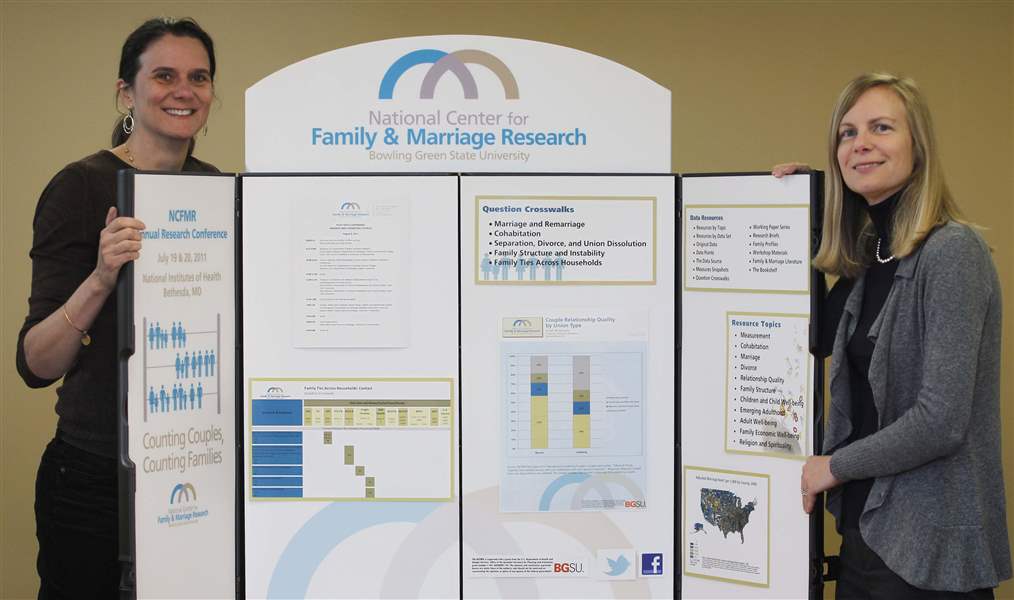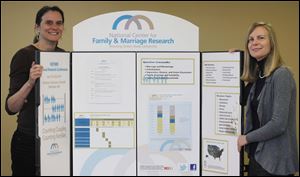
Modern families
Center on BGSU campus studying marriage and family trends
4/11/2012
Wendy Manning, left, and Susan Brown are co-directors of the National Center for Family and Marriage Research on the campus of Bowling Green State University.
The Blade/Lori King
Buy This Image

Wendy Manning, left, and Susan Brown are co-directors of the National Center for Family and Marriage Research on the campus of Bowling Green State University.
First comes love, then comes marriage -- at least that's the way it used to be.
Over the past decade, the progression of relationships described in the familiar ditty has been rearranged to fit complex situations. For some, it's first comes love, then comes living together. Others have rejected the order suggested in the playground chant, instead creating their own rules of the game.
Gone are the days of June Cleaver-style households and Brady Bunch families. They've been replaced by modern configurations that have redefined what family means.
"Family life in America is in flux. It's not one size fits all anymore," said Susan Brown, co-director of the National Center for Family and Marriage Research. "There are many different family types -- cohabiting families and same sex-couples, for example. We look at how people work and navigate family roles."
Established in 2007 by the Office of the Assistant Secretary for Planning and Evaluation in the U.S. Department of Health and Human Services, the center studies family life structure and marriage, and how they affect the health and well-being of families. The federally funded center is located on the campus of Bowling Green State University.
Using in-house analysis, demographers study family trends, including divorce, child-bearing, living arrangements, and economic well-being.
"There's a lot going on as far as marriage and families," Ms. Brown said. "Enough for the government to say 'Hey let's take a further look at this'."
Research shows, that for the first time in recent history, less than half of American adults are married and two out of five children are born to unmarried mothers.
"People are waiting longer to get married. People waiting longer to get married leads to children born out of wedlock and cohabitation," Ms. Brown said. "And we have a high divorce rate compared to other countries. It's not increasing, but it's high.
"We want children to grow up and be productive citizens, so we look at how the family can help or hinder that."
Despite the numbers, Americans remain optimistic about marriage, said Wendy Manning, co-director of the center.
"People still want to get married," Ms. Manning said. "But there's more pressure than ever before on families. For some, it may take more to get married. To maintain a middle-class lifestyle, it may take two incomes, and with the economy and unemployment, it's more challenging."
Both co-directors double as professors at the university. Ms. Brown is a professor of sociology with an emphasis on family and Ms. Manning is a professor of sociology who also teaches graduate seminars on fertility.
The women competed in a national call for applications to host the center. They were awarded a $4 million federal grant and five years to address key research questions, develop and train future researchers, improve research methods and data, and disseminate findings. BGSU has also invested in the research.
"Our funders had a long list of topics they were interested in," Ms. Brown said. "It went along with some of the topics we were interested in and the university supported."
Since the center's founding in 2007, Ms. Brown and Ms. Manning have been sought out for interviews with national newspapers and morning news shows.
On its Web site, the center shares its findings through working papers, Web casts, and a monthly newsletter with more than 2,000 subscribers.
Each year, the center offers grants and research opportunities. It also hosts a national conference in Washington for policy makers, lobbyists, and anyone else interested in its findings.
"We can help inform policy makers, but we don't provide solutions," Ms. Brown said. "It's not our mission. We're not policy makers."
The center is in it's final year of the grant, but there's still work to be done, the directors say.
"Issues surrounding family hits all areas in the federal government," Ms. Manning said. "We hope the government thinks this is still a question so that we can continue."
Contact RoNeisha Mullen at rmullen@theblade.com or 419-724-6133.